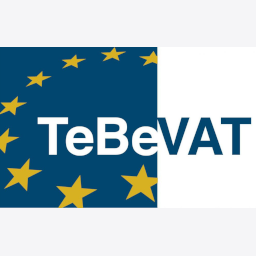
| Förderprojekt | TeBeVAT – Teilzertifizierung im Berufsfeld Veranstaltungstechnik |
| Fördergeber | Europäische Kommission |
| Förderschwerpunkt | ERASMUS+ |
| Projektwebseite | www.tebevat.eu |
| Projektpartner | BF/M-Bayreuth (Konsortialführer) StudioCentroVeneto, www.studiocentroveneto.com, Italien SV-wtu e.U., www.sv-wtu.at, Österreich STEPP vzw, www.stepp.be, Belgium Gecko Programmes Ltd, Großbritannien VPLT – Verband für Medien- und Veranstaltungstechnik e.V., Hannover |
| Kooperationspartner | |
| Dauer des Projekts | 01.09.2015 bis 31.08.2017 |
| Verantwortlicher Vorstand | Prof. Dr. Torsten Kühlmann |
| Verantwortliche Mitarbeiter | Julia Hoffmann, Dipl.-Sozialw. (ehemalige Mitarbeiterin), Manuel Wolz, Dipl.-SpOec. (ehemaliger Geschäftsführer) |
Projekthintergrund
Das BF/M-Bayreuth hat sich in der Antragsrunde 2015 des EU-Förderprogramms Erasmus+ „Zusammenarbeit zur Förderung von Innovation“ gemeinsam mit dem Nürnberger Personalentwickler Dr. Michael Beck und der Unternehmensberaterin bei der Nationalen Agentur in Bonn um eine Förderung beworben.
Als Konsortialführer konnte das BF/M-Bayreuth unter der Leitung von Herrn Prof. Kühlmann mit seinen Partnern aus Italien (StudioCentroVeneto, www.studiocentroveneto.com), den Niederlanden (Vereniging voor Podiumtechnologie, www.vpt.nl), Österreich (SV-wtu e.U., www.sv-wtu.at), Großbritannien (Gecko Programmes Ltd, www.geckoprogrammes.co.uk) und Hannover (VPLT – Verband für Medien- und Veranstaltungstechnik e.V., www.vplt.org) den Förderzuschlag für das genannte zweijährige Projektvorhaben im Bereich „Strategische Partnerschaften in der beruflichen Aus- und Weiterbildung“ des EU-Förderprogramms ERASMUS+ gewinnen.
Projektziele
Im Fokus der zum 1. September 2015 gestarteten Pilotstudie TeBeVAT steht die Validierung von Lernergebnissen aus nicht-formalem und informellem Lernen und deren Zuführung zu formalen Zertifizierungen im Teilbereich Tontechnik des Berufsfeldes Veranstaltungstechnik. Das beantragte Vorhaben soll auf dem Gebiet der Validierung von beruflichen Kompetenzen praktikable Erkenntnisse gewinnen und lässt sich dem personalwirtschaftlichen Bereich der Potenzialerkennung zuordnen.
Da sich der Arbeitsmarkt der Veranstaltungstechnik – neben einer hohen Dichte von Quereinsteigern – weitgehend grenzüberschreitend darstellt, d. h. sowohl Veranstalter als auch
deren Services insbesondere bei Großveranstaltungen oftmals internationale Wirksamkeiten und Ansprüche generieren, empfiehlt sich vor dem Hintergrund bildungspolitischer Ziele der EU (insb. Etablierung eines Europäischen Qualifikationsrahmens EQR, Europäisches Leistungspunktesystem ECVET) eine grenzüberschreitende Zusammenarbeit.
Als Hauptproblematik konnte hierbei das Fehlen anerkannter und bewährter Diagnoseinstrumente, welche das tatsächliche berufliche Verhalten von Stelleninhabern ohne formalen Abschluss empirisch valide erfassen, ausgemacht werden. Es ist davon auszugehen, dass die offiziellen und formalen Prüfungsinstitutionen ihre Zertifizierungen – im Normalfall auch nur Teilzertifizierungen – nur dann ausstellen, wenn eine valide Erfassungsdiagnostik nachgewiesen werden kann. Entsprechend sollen im Rahmen des Projektes die relevanten Stakeholder danach befragt werden, unter welchen Bedingungen sie nach einer Vorlage diagnostizierter Befunde entsprechende Anerkennungsverfahren zulassen bzw. selbst installieren würden.
Projektablauf
Im Projektverlauf werden alle Partner innerhalb ihres länderspezifischen Bildungssystems und deren korrespondierenden Orte informellen Lernens in Kontakt treten mit Quereinsteigern, professionelle Lernergebnisse feststellen, projektintern validieren und die Erkenntnisse projektübergreifend, öffentlichkeitswirksam und in Abstimmung mit den nationalen Zertifizierungseinheiten präsentieren.
Dem BF/M-Bayreuth als Konsortialführer obliegt hierbei die Entwicklung des Diagnoseinstruments, die Unterstützung und Mitarbeit bei den Datenerhebungen, das Ausarbeiten von Leitfäden und Berichten sowie die Koordination und Angleichung inhaltlicher und nicht zuletzt auch der administrativen Ergebnisse und Vorgehensweisen.
